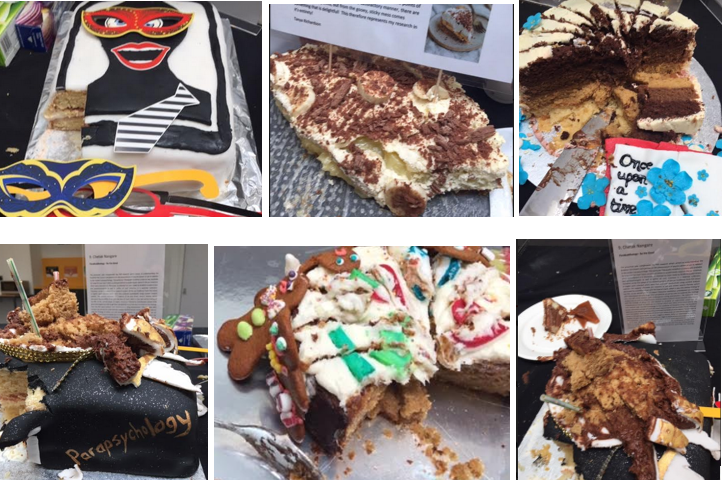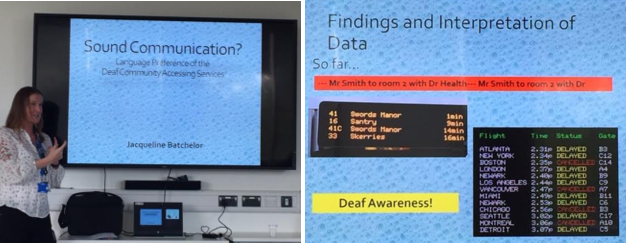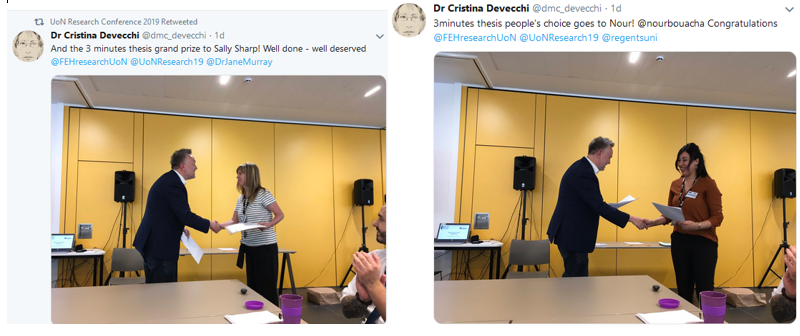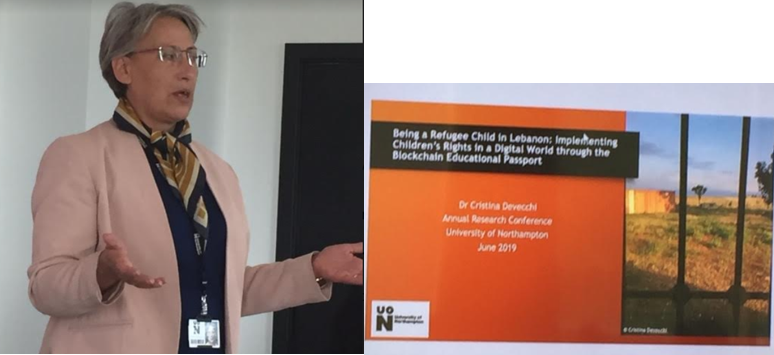
Since seeing the quote ‘a PhD is a thing of joy‘ at last week’s Research Conference at the University of Northampton, I’ve been reflecting on the possibilities of my doctoral research creating joy.
I’ve come to the conclusion joy is a very real possibility. However, there needs to be certain criteria in place for it to manifest. A PhD should be memorable for the right reasons. It requires strong motivation for when times get tough and it can be hard to feel joyous when you’re conducting research part time, at a distance and reliant on digital communication with your host institution.

Today, with my viva booked for September and light shining at the end of the doctoral tunnel, it would be easy to gloss over the tough parts and present it as a thing of joy. But that wouldn’t do justice to those negotiating the challenges of part-time distance study. At the end of the day, it’s supporting the remote part-timers which I think matters most.
I’m not sure expecting the process to be a ‘thing of joy’ is as helpful as offering practical support from an insider experience.
The loneliness of the long distance learner is hard to anticipate – which is good.
If I really knew what lay ahead, would I have still applied?
Unequivocally…
Yes!
Because…
A PhD is about making original claims to knowledge. That’s a privilege but one which shouldn’t be underestimated. Your research outputs need to be meaningful to an external audience. They have to be authentic, valid, and rigorous. This means your PhD will possibly be the most challenging and rewarding academic experience of your life but it will be worth it.
Say it again.
It will be worth it!

In 2014 I posted my top tips for surviving a part time phd. More recently (November 2018) I revisited them. Looking back, I believe they’re still applicable so here’s my advice for anyone thinking of going down the part-time doctoral route.
- If your early research interests lie outside work, re-consider a work-related subject. The chances of completing are increased by the connections between research and daily practice.
The first year of my doctorate was spent planning to research digital exclusion in the community. It was based outside higher education and failed because it was not linked to my day-to-day work. Once I shifted to researching an area within my own practice it became achievable.
- You need passion for the subject so to stay the course it helps to make your research personal;
- There will never be enough hours in the days, weeks and months ahead, so ensure the topic informs what you do. Your chances of completing are increased by the number of connections between research and daily practice.
- Don’t be overly ambitious. Your PhD is unlikely to change the world. Aim for making small but meaningful changes.
- A doctorate is about learning to use the tools of research as much as the research outputs themselves.

A PhD isn’t a mystery. There are set rules underpinning the process. Learning these will lay the foundation for research in the future.
- The regulations of doctoral research are laid out in your institutional guidance. Find this. Re-read often.
- There are dozens of books containing research guidance. Find the book which ‘speaks’ to you.
- Don’t be afraid to keep looking. When you find it, you’ll know it’s ‘yours’. Mine was the Action Research Dissertation by Kerr and Anderson. Reading this gave me the confidence I needed to move forward.
View the component parts of your research holistically. A doctoral project is elastic. Like a cat’s cradle, its shape can move and shift so the component parts are best understood as linked rather than separate. Also, it takes time to understand how the most liberating aspect is the freedom to think outside the box.
- Doctoral research contains permission to be creative but this is also about being brave.

Know that your research doesn’t take shape at the beginning. It develops as you read and reflect, then read and write some more. Most of all, it emerges from conversations, with colleagues, family, friends – because only by talking about it – getting it out of your head and into reality – can it become clear. Answering questions from others surfaces what you’re doing.
- Have courage to put yourself in the public domain with all the risks of negative feedback. It’s part and parcel of being a doctoral researcher but part-time PhD students often lack opportunities to practice defending their choices.
- Practice talking about your research. Learn to explain succinctly to anyone who’ll listen.
- Take every opportunity to present. Feel the fear and do it. The experience of putting your research out there and inviting feedback from colleagues, friends and strangers will be invaluable.

I needed to understand my research was personal before I could begin to claim the necessary ownership.
- You have to own your research therefore its worth repeating that confidence and courage are two essential attributes.
- As is being brave enough to be original. Try out ideas with your supervisors. Your research deals with what’s new rather than what’s already known. The end conclusions may differ from early thoughts and directions. That’s ok. A Phd is a journey where the destination is not always known at the beginning.
It’s no exaggeration to say a part-time Phd will dominate your life. At some point you have to let it move in and take over.
This might mean neglecting other areas to give it space to grow. Family and friends may suffer your absence but it will be temporary.

Remember doctoral study can pose a trap you fall into. The walls get higher until the light disappears and it’s just you and your data. No one else can do the analysis for you.
- Create deadlines with targets and give yourself rewards for reaching them.
- Develop the sense you have something worthwhile to say. Your subject is unique, otherwise you wouldn’t be researching it.
- Join a research group. If you can’t find one, set one up. There will be others in similar positions to yourself. Seek them out.
- Write a blog. Even if the writing is for an audience of one – yourself – make the process of regular reflection on progress an exercise in conciseness.
- Remember the viva is time limited and you need to defend the core of your findings, not the peripheral externalities.

Research needs boundaries. At the beginning, there’s no horizon and I’ve always had problems with boundaries as described in Know Your Limits, Whenever I felt stuck, I revisited Lincoln and Guba’s advice on trustworthiness, in particular their evaluative criteria. Establishing these can offer an authentic framework within which to work.
- Credibility – confidence in the ‘truth’ of the findings
- Transferability – showing that the findings have applicability in other contexts
- Dependability – showing the findings are consistent and replicable
- Confirmability – neutrality or, in other words, the extent to which the findings are shaped by the respondents and not researcher bias, motivation, or interest.
The most liberating aspect is the freedom to think outside the box. Qualitative research contains permission to be creative. You’re looking for connections which haven’t been seen before. This takes imagination, sociological or otherwise. I needed to understand my research was personal before I could begin to claim the necessary ownership.

And therein lies the heart of doctoral study. Academic practice at Level 8 is a leap forward and working at Levels 5-7 doesn’t always prepare you for presenting and defending original claims to knowledge.
Your PhD is yours. Own it and be prepared to defend your findings. They belong to you. They’re totally unique and that’s a powerful position.
If you’re thinking of doing a doctorate, I hope this helps.
A PhD needs time and commitment. It might not always bring you joy but it will be worth it.
















